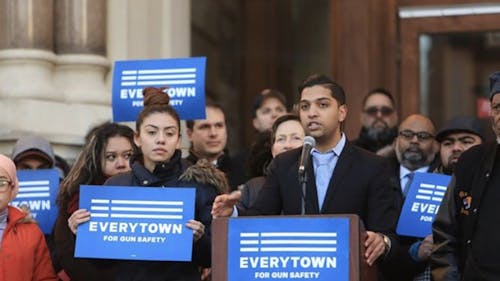Rutgers launches 8 new studies for its center on gun violence research

New Jersey's Center on Gun Violence Research has been allotted $2 million in state funds. Part of the money will go toward eight new research projects across Rutgers.
The center, which opened last spring, is 1 of 2 centers in the country dedicated to preventing gun violence. Since its inauguration, the center has been laying the groundwork for successful partnerships and outreach.
“Primarily, we have been building out our infrastructure and ramping up our scholarly program. We have been hiring staff and bringing on faculty and student affiliates, meeting with stakeholders in the community and across all levels of government and developing our research and programming agenda," said Paul Boxer, director of research at the center.
Jai Patel, a School of Arts and Sciences sophomore who is not affiliated with the center, has been advocating for gun violence prevention since his senior year of high school, when he and his friends hid in the back of a clothing store during a shooting at Newport Centre in Jersey City, New Jersey.
New Jersey's Center on Gun Violence Research is one of the reasons Patel said he decided to attend Rutgers for college. He is now working closely with the center to improve outreach.
“Research takes a while, but there's a great relationship between the governor's office and the research center. A lot of time has been spent on developing that. For a lot of the doctors, this is not their sole job. So it takes time. Without disclosing too much, we're probably going to see new developments on the horizon very soon, before the end of the year. That's all I can say right now,” Patel said.
The first eight projects chosen for funding represent the interdisciplinary nature of the center: looking at, understanding and preventing gun violence in innovative ways, Boxer said. The topics range from how school buildings can prevent gun violence to how to keep police officers safe.
“We reviewed proposals in-house as well as with input from established scholars working on gun violence issues outside of Rutgers University, and selected the best and most relevant proposals for funding. We chose projects based on their alignment with our missions, their innovation and their projected capacity to attract federal and private funding beyond the pilot phases,” Boxer said.
Patel, who specializes in rapid response rallies, said that research takes more time but is just as important as rallying and protesting.
“Statistics are great and grassroots marching is great, but one without the other? Nothing would get done. Research shows something that you can't argue. You can't argue with numbers and you can't argue with facts. A lot of people who don't react to the protests in the way that we want them to will have no chance but to react accordingly when research comes out showing that they're wrong,” Patel said.
While specific timelines vary depending on each project, the center hopes to share findings from the research over the course of this academic year.
"I like these projects.They’re hitting all aspects of the issue. Studying how the Cambodian genocide sheds light on white supremacy is an issue not a lot of people want to touch on. White supremacy is definitely an issue, not an illness. We're the only country that arms hate, especially because we give people who have these hateful thoughts easy access to weaponry that can cause mass casualties," Patel said.
Patel referred to Rutgers—Newark's Distinguished Professor of Anthropology Alexander Hinton’s project that uses his experience at the Khmer Rouge Tribunal in Cambodia as a way to understand white supremacist extremism in the United States.
“He is extending his very high-profile work on genocide around the world to examining the potential for domestic terrorism here in the United States — some of the overlap in causal factors. Professor Hinton has made a compelling case that guns and particularly the stockpiling of guns by potentially violent groups are part of the broader context in thinking about domestic terror, even here in New Jersey, and is exploring this in his funded research,” Boxer said.
New Jersey leads the country in gun sense laws, but still needs to focus on research and advocacy, Patel said.
“Even though we have strong gun laws in New Jersey, there's still gun violence mainly because there are guns smuggled in from other states like Virginia, Pennsylvania and Ohio. It's time to put more pressure on community involvement and neighboring states who refuse to get with the program,” Patel said.
New Jersey's Center on Gun Violence Research is working directly with local communities and all three Rutgers locations by linking faculty and developing studies that will have clear implications for communities all over the state, Boxer said.
“You can pass as many programs as you want, but it's more of a community outreach issue. You have to look at the community in these neighborhoods that we ostracize as ‘bad neighborhoods.’ They're closest to the problem, but they're also closest to the solution,” Patel said.



